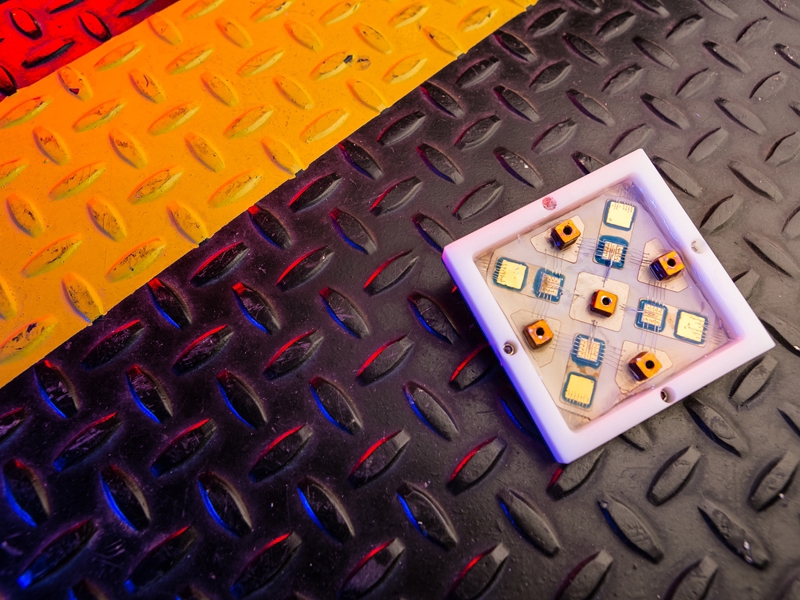
The University of Arkansas has taken the next step to becoming a national leader in the United States’ semiconductor economy. Semiconductors, such as silicon, are essential materials in most electronic devices and advance performance in fields such as healthcare, national defense, computing and transportation.
This August, the university began construction on the national Multi-User Silicon Carbide Research and Fabrication Facility, or MUSiC. Capable of silicon or silicon carbide chip fabrication, this new semiconductor research and fabrication facility will enable the government, businesses of all sizes and universities to prototype in silicon carbide, introducing a capability that does not presently exist in the U.S.
This unique facility will offer low-volume prototyping for high-volume manufacturing, bridging the gap between traditional university research and the needs of private industry. This will accelerate both workforce development and technological advancement in semiconductors by providing a single location where chips can go from developmental research to prototyping, testing and fabrication.
Alan Mantooth, Distinguished Professor of electrical engineering at the U of A, is principal investigator for MUSiC. He stated that with MUSiC, the university could “begin training the next generation at a variety of degree levels to provide well-trained and educated talent for  onshoring semiconductor manufacturing that domestic suppliers offshored in the late 90s and early 2000s. Our training will be equally applicable to silicon and silicon carbide and other materials.”
onshoring semiconductor manufacturing that domestic suppliers offshored in the late 90s and early 2000s. Our training will be equally applicable to silicon and silicon carbide and other materials.”
Construction coincides with the CHIPS America Summit on Aug. 17, an invitation-only event for research, industry and governmental leaders from across the nation to discuss CHIPS and Science Act semiconductor-related opportunities and the ways in which the U of A and the state of Arkansas are uniquely positioned to lead.
The summit will feature Director of External and Government Affairs for the U.S Department of Commerce’s CHIPS Program Office Adrienne Elrod. U.S. Representative Steve Womack and Arkansas Secretary of Commerce Hugh McDonald will also participate.
UNIQUELY POSITIONED FOR CHIPS
In addition to the MUSiC facility, the U of A is also home to the first Energy Frontier Research Center in Arkansas, as part of a team of researchers who received $10.35 million from the U.S. Department of Energy. The Center for Manipulation of Atomic Ordering for Manufacturing Semiconductors is dedicated to investigating the formation of atomic orders in semiconductor alloys and their effects on various physical properties. This research program will enable reliable, cost-effective and transformative manufacturing of semiconductors.
Researchers at the U of A previously established the MonArk NSF Quantum Foundry to accelerate the development of quantum materials and devices. In collaboration with Montana State University and other member universities, the foundry supports the study of 2-D materials — consisting of a single layer of bonded atoms — by aiding researchers and facilitating the exchange of ideas across academia and industry. The project leads the fabrication of 2-D material quantum devices and their characterization, using low-temperature electronic transport and optoelectronic techniques.
The U of A’s existing and expanding research foundation means it’s uniquely positioned to take advantage of the recent CHIPS (Creating Helpful Incentives to Produce Semiconductors) and Science Act, which is providing approximately $280 billion in funding to stimulate domestic research and manufacturing of semiconductors.
As a result of manufacturing and production shortages of essential computer chips during the pandemic, which are overwhelmingly manufactured overseas, the federal government has prioritized the onshoring of this critical technology.
About the University of Arkansas: As Arkansas' flagship institution, the U of A provides an internationally competitive education in more than 200 academic programs. Founded in 1871, the U of A contributes more than $2.2 billion to Arkansas’ economy through the teaching of new knowledge and skills, entrepreneurship and job development, discovery through research and creative activity while also providing training for professional disciplines. The Carnegie Foundation classifies the U of A among the few U.S. colleges and universities with the highest level of research activity. U.S. News & World Report ranks the U of A among the top public universities in the nation. See how the U of A works to build a better world at Arkansas Research and Economic Development News.

The national Multi-User Silicon Carbide Research and Fabrication Facility, or MUSiC, will provide opportunities for the government and business of all sizes, and universities to prototype in silicon carbide, introducing a capability that does not currently exist in the U.S.
Topics
Contacts
Alan Mantooth, distinguished professor of electrical engineering
College of Engineering
479-575-4838, mantooth@uark.edu
Hardin Young, assistant director of research communications
University Relations
479-575-6850,
hyoung@uark.edu